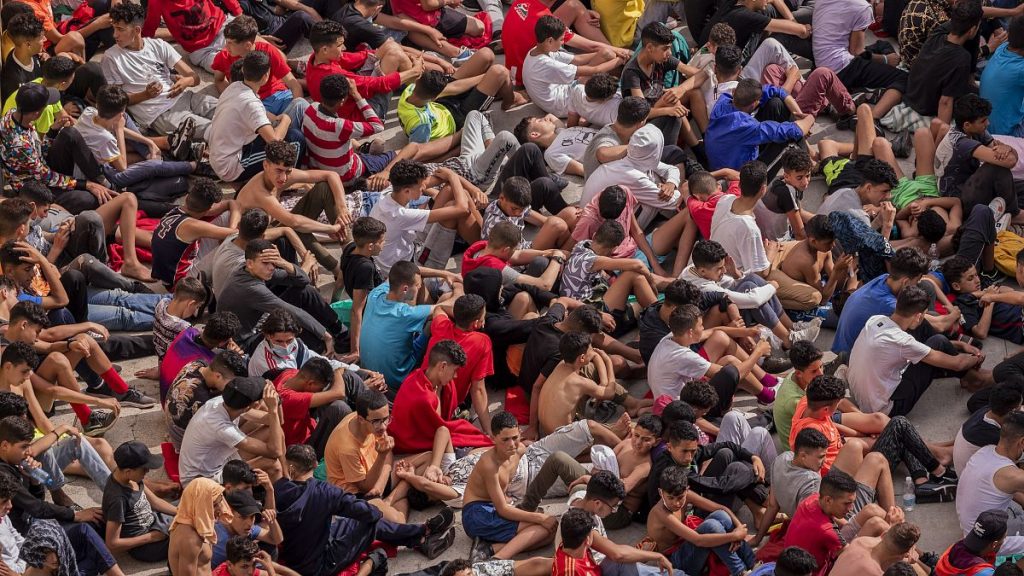The perilous journey across the Mediterranean continues to claim the lives of migrants, including vulnerable women and children, prompting urgent calls for international action. Recent shipwrecks off the coast of Tunisia, a frequent departure point for those seeking refuge in Europe, tragically underscore the risks undertaken by individuals fleeing desperate circumstances. UNICEF, deeply concerned by the escalating death toll, particularly amongst children, has implored governments to prioritize the safety and well-being of these young migrants. The accounts of surviving children, including an eight-year-old girl separated from her mother and an eleven-year-old girl who may be the sole survivor of a capsized vessel, paint a harrowing picture of the human cost of this ongoing crisis. These tragedies amplify the urgent need for coordinated efforts to prevent further loss of life and provide adequate support for those who survive these treacherous journeys.
The International Organization for Migration (IOM) reports a staggering number of missing migrants in the Mediterranean, with over 2,275 unaccounted for in 2024 alone, adding to the grim total of over 31,180 missing since 2014. The central Mediterranean route, notorious for its dangers, remains the primary passage used by smugglers operating from Libya and Tunisia, exploiting the desperation of migrants seeking a better life. The overwhelming majority of those lost at sea are believed to have perished on this perilous route, highlighting the urgent need for effective search and rescue operations and measures to disrupt the criminal networks facilitating these dangerous crossings. UNICEF’s plea to governments emphasizes the legal and moral obligation to protect vulnerable children, advocating for safe and legal pathways for protection and family reunification.
UNICEF’s call to action underscores the need for a multi-faceted approach to address the migration crisis. The organization urges governments to uphold international law concerning refugees and prioritize the safeguarding of children through comprehensive support systems. These include coordinated search and rescue efforts, safe disembarkation procedures, community-based reception centers, and unimpeded access to asylum services. Furthermore, UNICEF stresses the importance of investing in essential services for children and families who arrive via dangerous migration routes, encompassing psychosocial support, legal aid, healthcare, and educational opportunities. These services are crucial for helping these vulnerable individuals integrate into new communities and rebuild their lives.
The European Union’s response to the migrant crisis has been complex and often fraught with challenges. Italy, under the leadership of Prime Minister Giorgia Meloni, has implemented stricter measures to curb migrant arrivals, including cracking down on smuggling operations and exploring the possibility of processing asylum claims in Albania. Eurostat data reveals variations in the number of asylum applications filed by unaccompanied minors across EU member states. In 2023, Italy received over 2,200 applications, Greece over 2,600, and Spain a significantly lower number at just 30. These figures likely reflect differing migration routes and policies adopted by individual countries. Notably, applications from unaccompanied minors across the EU have seen a general decline since peaking at over 88,000 in 2015, potentially influenced by changing geopolitical dynamics and border control measures.
The ongoing plight of migrants attempting to reach Europe, and particularly Spain, is further highlighted by the alarming statistics reported by Caminando Fronteras (Walking Borders), a Spanish migration rights group. Their data indicates that over 10,000 migrants perished in 2023 while attempting to reach Spain by sea. This underscores the persistent dangers faced by migrants seeking refuge in Europe, emphasizing the need for continued efforts to ensure safe passage and address the root causes that compel individuals to embark on these perilous journeys. The high number of deaths also raises questions about the effectiveness of existing search and rescue operations and the need for greater international cooperation to prevent further loss of life.
The confluence of recent tragedies, coupled with the staggering number of missing migrants, reinforces the urgency of a comprehensive and coordinated response to the Mediterranean migration crisis. The international community must address the root causes of migration, enhance search and rescue capabilities, and ensure the protection of vulnerable children and families. A concerted effort involving governments, international organizations, and civil society is crucial to mitigate the human cost of this ongoing tragedy and provide safe and humane pathways for those seeking refuge. The focus must shift from reactive measures to proactive strategies that prioritize human dignity and prevent further loss of life in the treacherous waters of the Mediterranean.














